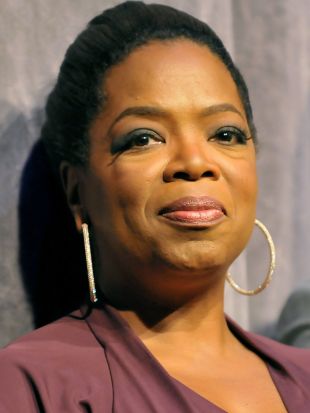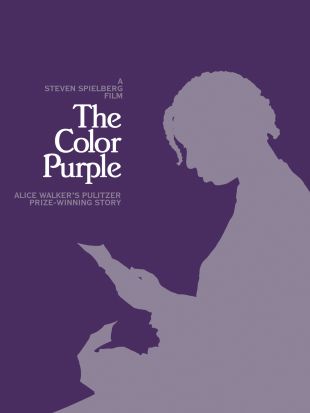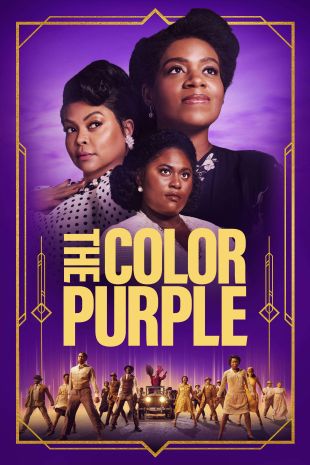Oprah Winfrey rose from poverty and a troubled youth to become the most powerful and influential woman in television and, according to Forbes Magazine, the world's most highly paid entertainer. Though primarily recognized as a talk show hostess, Winfrey also produces and occasionally acts in television movies and feature films.
Winfrey's parents, who never married, were teens when she was born in rural Mississippi. She was originally named Orpah after a woman from the Book of Ruth but a spelling mistake on the birth certificate changed it to Oprah. She spent her childhood growing up in abject poverty on her deeply religious grandmother's farm. When she was older, Winfrey moved in with her mother in Milwaukee, WI. This proved a difficult time as Winfrey alleges she was repeatedly sexually molested by male relatives. Winfrey became a bit of a wild child during her early teens, experimenting with sex and drugs until the age of 14 when she gave birth to a premature baby. It died shortly after, and upon recovering, Winfrey chose to live with her father in Nashville. It was under his stern guidance that Winfrey found discipline, stability, and the inspiration to excel in school and change her life.
When she was 19, Winfrey became a part-time radio reporter for station WVOL, Nashville, and also began studying speech and performing arts at Tennessee State University. She dropped out in 1972 during her sophomore year to become an anchor at Nashville's WTVF-TV. She was the first black woman to hold that position. In 1976, she moved to WJZ-TV and after a stint as a reporter was promoted to co-anchor. Two years after her arrival, Winfrey was slotted (with some trepidation by producers who weren't sure how audiences would respond to a host who was neither white nor thin) to host their talk show People Are Talking. Their worries were unfounded for the charming, empathetic Winfrey's show was a hit and remained so for eight years.
In 1984, Winfrey took a major risk and accepted a job hosting a Chicago morning talk show, one that aired at the same time as the nationally top-rated, Chicago-based Phil Donahue talk show. This time it was her fears that had no basis for she soon found herself neck and neck in the ratings with Donahue. Her show also went nationwide through King World Syndicate and as she expanded the operation, the money began rolling in. With the purchase of a large downtown production facility, Winfrey was able to become the third woman in the American entertainment industry -- after Mary Pickford and Lucille Ball -- to own her own studio. She named it Harpo, which is, of course, "Oprah" spelled backwards. Using her considerable business acumen, Winfrey translated her show into a multi-million-dollar business, making her the wealthiest black woman in the U.S.
Her show was groundbreaking for several reasons, but most of all because Oprah was unafraid to bare her soul and her own past experiences in front of audiences whereas most talk show hosts remained reserved in regard to their personal lives. Though it was difficult, she made public her past abuse, her drug problem during her twenties, and her struggle with obesity. In this latter area, Oprah, took a lot of heat from unkind critics who were unable to cope with the notion that a round woman could possibly be considered attractive, intelligent, and vital. She endured cruel jokes and jibes until she finally decided to lose weight, first with a radical liquid diet -- which only temporarily took off her weight -- and then with a rigorous fat-free diet and exercise regimen that kept her weight off.
Like Donahue and the other talk show hosts of the day, Winfrey's program tended toward sensationalism designed to appeal to our most morbid curiosities. Subject-wise, she had begun hitting all-time lows by 1994. That year, she was to turn 40 and was thinking heavily about which direction her life might turn, both professionally and personally. There was a question whether or not she would even continue taping the show. She ultimately decided to stay on the air, but only after publicly promising to move her show to a higher, more uplifting level.
In addition to her reign as "queen of the daytime talk shows," Winfrey has also proven herself a gifted actress. In 1985, she received an Oscar nomination for Best Supporting Actress with her film debut as Sofia in Steven Spielberg's The Color Purple. Later, she began working behind the scenes, executive producing and starring in Donna Deitch's acclaimed 1989 television movie The Women of Brewster Place, which later became a short-lived series.
After the success of her book club, Winfrey began producing popular films based on some of her favorite contemporary written works. Along with executive-producing made-for-television adaptations such as David and Lisa, Tuesdays with Morrie, and Oprah Winfrey Presents: The Wedding, she served as producer on the 1998 big-screen adaptation of Toni Morrison's Beloved, a film she also costarred in.
Winfrey continued to be a powerful force in the world of day-time television in 2003, when she spun off a regular segment from her show featuring psychologist Dr. Phil McGraw into McGraw's own daily program, Dr. Phil. Oprah founded a television channel (OWN -- Oprah Winfrey Network) after the final episode of the Oprah Winfrey show aired on May 5th, 2011.



